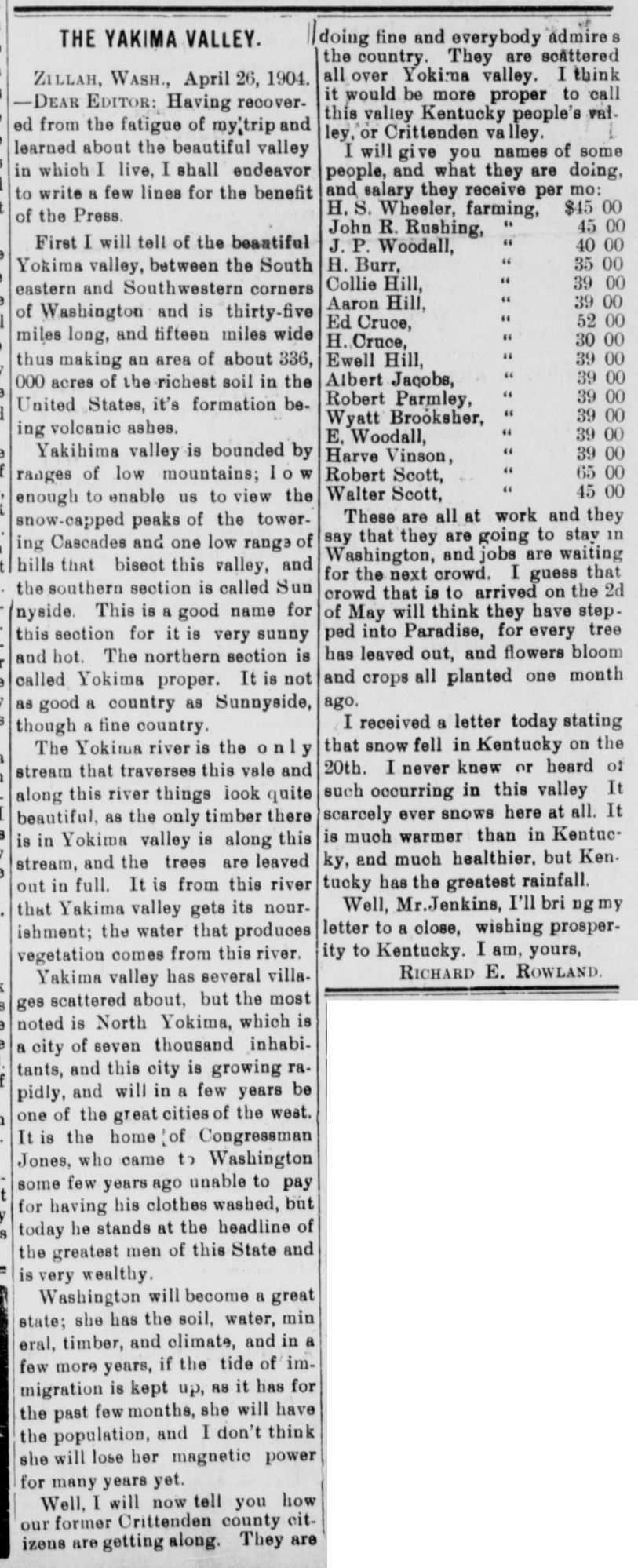May 12, 1904
THE YAKIMA VALLEY.
ZILLAH, WASH., April 26, 1904.--DEAR EDITOR: Having recovered from the fatigue of my trip and learned about the beautiful valley in which I live, I shall endeavor to write a few lines for the benefit of the Press.
First I will tell of the beautiful Yokima [sic] valley, between the Southeastern and Southwestern corners of Washington and is thirty-five miles long, and fifteen miles wide thus making an area of about 336,000 acres of the richest soil in the United States, it's formation being volcanic ashes.
Yakihima [sic] valley is bounded by ranges of low mountains; low enough to enable us to view the snow-capped peaks of the towering Cascades and one low range of hills that bisect this valley, and the southern section is called Sunnyside. This is a good name for this section for it is very sunny and hot. The northern section is called Yokima [sic] proper. It is not as good a country as Sunnyside, though a fine country.
The Yokima [sic] river is the only stream that traverses this vale and along this river things look quite beautiful, as the only timber there is in Yokima [sic] valley is along this stream, and the trees are leaved out in full. It is from this river that Yakima valley gets its nourishment; the water that produces vegetation comes from this river.
Yakima valley has several villages scattered about, but the most noted is North Yokima [sic], which is a city of seven thousand inhabitants, and this city is growing rapidly, and will in a few years be one of the greatest cities of the west. It is the home of Congressman Jones, who came to Washington some few years ago unable to pay for having his clothes washed, but today he stands at the headline of the greatest men of this State and is very wealthy.
Washington will become a great state; she has the soil, water, mineral, timber, and climate, and in a few more years, if the tide of immigration is kept up, as it has for the past few months, she will have the population, and I don't think she will lose her magnetic power for many years yet.
Well, I will now tell you how our former Crittenden county citizens are getting along. They are doing fine and everybody admires the country. They are scattered all over Yokima [sic] valley. I think it would be more proper to call this valley Kentucky people's valley, or Crittenden valley.
I will give you names of some people, and what they are doing, and salary they receive per mo:
H. S. Wheeler, Farming, $45 00
John R. Rushing, " 45 00
J. P. Woodall, " 40 00
H. Burr, " 35 00
Collie Hill, " 39 00
Aaron Hill, " 39 00
Ed Cruce, " 52 00
H. Cruce, " 30 00
Ewell Hill, " 39 00
Albert Jacobs, " 39 00
Robert Parmley, " 39 00
Wyatt Brooksher, " 39 00
E. Woodall, " 39 00
Harve Vinson, " 39 00
Robert Scott, " 62 00
Walter Scott, " 45 00
These are all at work and they say that they are going to stay in Washington, and jobs are waiting for the next crowd. I guess that crowd that is to arrived on the 2d of May will think they have stepped into Paradise, for every tree has leaved out, and flowers bloom and crops all planted one month ago.
I received a letter today stating that snow fell in Kentucky on the 20th. I never knew or heard of such occurring in this valley. It scarcely ever snows here at all. It is much warmer than in Kentucky, and much healthier, but Kentucky has the greatest rainfall.
Well, Mr. Jenkins, I'll bring my letter to a close, wishing prosperity to Kentucky. I am yours,
RICHARD E. ROWLAND
Source: Crittenden Press. (Marion, Ky.) 1886-1907, May 12, 1904, Image 7 - Chronicling America - The Library of Congress.
[My comments are in brackets.]
